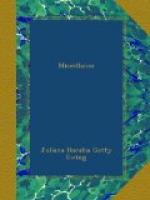Above all, out-door May Fun is no fun unless the weather is fine; and I hope this little paper will show that if the 1st of May is chilly, and the flowers are backward, nothing can be more proper than to keep our feast on the 12th of May—May-day, Old Style. If the Clerk of the Weather Office is unkind on both these days, give up out-door fun at once, and prepare for a fancy-ball in the nursery; all the guests to be dressed as May-day characters. Garland-making and country expeditions can then be deferred till Midsummer-day. It is not very long to wait, and penny trumpets do not spoil with keeping.
But do not be defrauded of at least one early ramble in the woods and fields. It is well, in the impressionable season of life, to realize, if only occasionally, how much of the sweetest air, the brightest and best hours of the day, people spend in bed. Any one who goes out every day before breakfast knows how very seldom he is kept in by bad weather. For one day when it rains very early there are three or four when it rains later. But we wait till the world has got dirty, and the air full of the smoke of thousands of breakfasts, and clouds are beginning to gather, and then we say England has a horrible climate. I do not believe in many quack medical prescriptions, but I have the firmest faith in May dew as a wash for the complexion. Any morning dew is nearly as efficacious if it is gathered in warm clothes, thick boots, and at a sufficient distance from home.
There are some households in which there are no children, and there are some in which the good things of this life are very abundant. To these it may not be very impertinent to suggest a remembrance of the old alderman of Lynn’s kindly benefaction. To beg leave for the children of the workhouse to gather May-day nosegays for you, and to give them a May feast afterwards, would be to give pleasure of a kind in which such unhomely lives are most deficient. A country ramble “with an object,” and the grace-in-memory of a traditionary holiday and feast, shared in common with many homes and with other children.
To go a-Maying “to fetche the flowres fresh” is indeed the best part of the whole affair.
But, when the sunny bank under the hedge is pale with primroses, when dog-violets spread a mauve carpet over clearings in the little wood, if cowslips be plentiful though oxslips are few, and rare orchids bless the bogs of our locality, pushing strange insect heads, through beds of Drosera bathed in perpetual dew—then, dear children, restrain the natural impulse to grub everything up and take the whole flora of the neighbourhood home in your pinafores. In the first place, you can’t. In the second place, it would be very hard on other people if you could. Cull skilfully, tenderly, unselfishly, and remember what my mother used to say to me and my brothers and sisters when we were “collecting” anything, from fresh-water algae to violet roots for our very own gardens, “Leave some for the Naiads and Dryads.”




